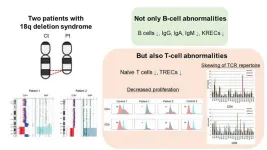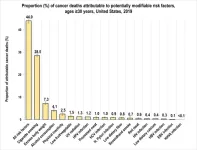(Press-News.org) Children exposed to vaping indoors absorb less than one seventh the amount of nicotine as children who are exposed to indoor smoking, but more than those exposed to neither, according to a new study led by UCL researchers.
The study, published in JAMA Network Open and funded by Cancer Research UK, looked at blood tests and survey data for 1,777 children aged three to 11 in the United States.
The researchers said that second-hand exposure to harmful substances in e-cigarettes would likely be much lower still, as e-cigarettes deliver similar levels of nicotine to tobacco but contain only a fraction of the toxicants and carcinogens.
The researchers looked at nicotine absorption in children, but they said the findings were likely to be similar for adults.
Lead author Dr Harry Tattan-Birch, of the UCL Institute of Epidemiology & Health Care, said: “Our study shows, using data from the real world rather than an artificial lab setting, that nicotine absorption is much lower from second-hand vapour than from second-hand smoking.
“Nicotine itself is of limited risk, but it shows what the highest possible exposure might be from second-hand vaping. Exposure to harmful non-nicotine substances present in vapour will likely be substantially lower still.”
Senior author Professor Lion Shahab, of the UCL Institute of Epidemiology & Health Care, said: “This paper suggests that concerns about second-hand vaping may be somewhat overstated, with second-hand exposure to toxic substances likely to be very low.
“The findings confirm the risks of smoking indoors around children, which should be avoided at all costs. However, as second-hand vaping still exposes children to more harmful substances than no vaping or smoking exposure at all, it is best to avoid indoor vaping around children, too.”
The study used data from a nationally representative sample of children in the US, collected between 2017 and 2020 as part of the annual US National Health and Nutrition Examination Survey (NHANES).
Blood tests that detected the concentration of cotinine were used to assess how much nicotine the children had absorbed. Cotinine is a chemical the body produces after exposure to nicotine. Survey responses indicated if the children had been exposed to smoking or vaping indoors in the past week.
The researchers focused on data from children as, unlike adults, children were unlikely to have vaped or smoked themselves, meaning higher nicotine absorption was a result of second-hand vapour or smoke only. However, two children were excluded from the analysis for having a cotinine concentration that suggested they had vaped or smoked directly. Children exposed to both indoor smoking and vaping were also excluded from the analysis.
The team found that children exposed to indoor vaping absorbed 84% less nicotine than children exposed to indoor smoking, while children exposed to neither absorbed 97% less.
The lower levels of nicotine among those exposed to second-hand vaping were consistent with previous laboratory studies finding that people retained 99% of the nicotine they produced during vaping. With tobacco cigarettes, smoke is generated both by smokers breathing out as well as by the lighted end of the cigarette. E-cigarettes, however, do not generate aerosol aside from when vapers exhale.
The researchers said their findings had implications for whether vaping should be allowed indoors, providing further evidence that the impact of vaping on bystanders’ health will be much less than smoking.
However, the researchers said there were other factors to consider when assessing whether indoor spaces should be made vape-free. In particular, if vaping commonly occurs indoors, this may normalise the behaviour, encouraging people to start vaping and making it harder for them to stop.
Previous research from the same team showed that adults in England were much more likely to vape than smoke indoors, with nine in 10 vapers found to vape inside, while only half of smokers smoked inside.
END
Second-hand vaping exposure very low compared to second-hand smoking
Children exposed to vaping indoors absorb less than one seventh the amount of nicotine as children who are exposed to indoor smoking, but more than those exposed to neither, according to a new study led by UCL researchers.
2024-07-11
ELSE PRESS RELEASES FROM THIS DATE:
Biological science helps fuel the future of electric air travel
2024-07-11
– By William Ferguson
When it comes to figuring out why electric aircraft batteries lose power over time, one typically wouldn’t think to turn to a decades-old approach biologists use to study the structure and function of components in living organisms. However, it turns out that omics, a field that helped scientists unravel the secrets of the human genome, could also soon play a key role in making carbon-free air travel a reality.
In a new study in the journal Joule, a team of researchers led ...
Electric aviation: Batteries that stay strong for the flight duration
2024-07-11
Images
A battery component innovation could help keep power delivery high when electric aircraft land with low charge, according to a study led by Lawrence Berkeley National Laboratory with expertise from the University of Michigan.
The research provides a solution to a problem identified in 2018 in a study led by Venkat Viswanathan, a professor of aerospace engineering at U-M and a coauthor of the new work published in Joule.
"Both takeoff and landing require high power, and landing is more challenging because you’re not fully charged," Viswanathan said. "To get high power you ...
Uncovering late-onset combined immune deficiency in chromosome 18q deletion syndrome
2024-07-11
Tokyo Medical and Dental University (TMDU) researchers have discovered that patients with 18q deletion syndrome can experience both cellular and humoral immunodeficiency
Tokyo, Japan – Chromosome 18q deletion (18q del) syndromeis a rare genetic condition disorder, affecting approximately 1 in 40,000 to 55,000 individuals, caused by the deletion of genetic material on the long arm of chromosome 18. This genetic anomaly disrupts normal growth and development, and critically, can impair the immune system's functionality. Patients with 18q del syndrome often exhibit humoral immunodeficiency or a common ...
SciOpen, an international digital publishing platform for STM journals, unveils new updates
2024-07-11
On June 30, 2024, SciOpen 2.0 was officially launched. Developed by Tsinghua University Press, SciOpen initially made its debut in June 2022 as an international digital publishing platform for STM journals. After two years of global operation and continuous iterative upgrades, SciOpen 2.0 has fully embraced the best practices of mainstream publishing models. SciOpen has completed a comprehensive upgrade of its interactive system design and has integrated advanced large-model AI reading capabilities, marking a significant leap forward in its functionality.
These updates steer SciOpen towards ...
JMIR Bioinformatics and Biotechnology is inviting submissions for a new theme issue titled “Artificial Intelligence in Oncology”
2024-07-11
(Toronto, July 11, 2024) JMIR Publications invites submissions to a new theme issue titled “Artificial Intelligence in Oncology” in its premier open access journal JMIR Bioinformatics and Biotechnology indexed in PubMed Central and PubMed, SCOPUS, Sherpa/Romeo, DOAJ and EBSCO/EBSCO Essentials.
Artificial intelligence (AI) has the potential to revolutionize oncology by enhancing diagnostic accuracy, personalizing treatment plans, predicting patient outcomes, and accelerating drug discovery. Researchers, clinicians, and industry experts are invited ...
New study finds 40-percent of cancer cases and almost half of all deaths in the US linked to modifiable risk factors
2024-07-11
A new study led by researchers at the American Cancer Society (ACS) finds four in 10 cancer cases and about one-half of all cancer deaths in adults 30 years old and older in the United States (or 713,340 cancer cases and 262,120 cancer deaths in 2019) could be attributed to modifiable risk factors, including cigarette smoking, excess body weight, alcohol consumption, physical inactivity, diet, and infections. Cigarette smoking was by far the leading risk factor, contributing to nearly 20% of all cancer cases and 30% of all cancer deaths. The findings are ...
Pathogen prioritization for wastewater surveillance ahead of the Paris 2024 Olympic and Paralympic Games, France
2024-07-11
The study by researchers from the French national public health institute aimed to identify priority pathogens that could be suitable for wastewater surveillance (WWS) during the Paris 2024 Olympic and Paralympic Games taking place from 26 July to 11 August and 28 August to 8 September, respectively. The pathogens were evaluated using a Delphi method which integrated evidence from peer-reviewed publications and expert opinion.
WWS has become more prominent due to its role during the COVID-19 pandemic. As a non-intrusive, cost-effective surveillance tool, WWS offers ...
Bacteria form glasslike state
2024-07-11
Dense E.coli bacteria have several similar qualities to colloidal glass, according to new research at the University of Tokyo. Colloids are substances made up of small particles suspended within a fluid, like ink for example. When these particles become higher in density and more packed together, they form a “glassy state.” When researchers multiplied E.coli bacteria within a confined area, they found that they exhibited similar characteristics. More surprisingly, they also showed some other unique properties not typically found in glass-state materials. This study contributes to our understanding of glassy “active matter,” a relatively new field of ...
Prestigious MERIT grant funds research on how the immune system can banish HIV
2024-07-11
Weill Cornell Medicine has received $4.2 million to study how the immune system in some people infected with HIV can keep the virus under control, which could lead to novel therapeutic strategies for thwarting or eliminating HIV. Dr. Brad Jones, associate professor of immunology in medicine in the Division of Infectious Diseases at Weill Cornell Medicine, was awarded a MERIT grant from the National Institute for Allergy and Infectious Diseases (NIAID) at the National Institutes of Health (NIH).
The “Method for Extending Research in Time” (MERIT) grant provides ...
Research reveals novel CARS E795V mutation as cause of inherited Parkinson's disease
2024-07-11
According to Science Alert, neuroscientists from Johns Hopkins University have recently discovered a new treatment for Parkinson's disease using an FDA-approved cancer drug. A recent study published in Neuroscience Bulletin reveals the genetic cause of Parkinson's disease. The study discovered that a mutation in the Cysteinyl-tRNA synthetase (CARS) gene (c.2384A>T; p.Glu795Val; E795V) is responsible, offering a new path for prevention and control of the disease. This research was conducted by a team led by Zhang Jianguo, including researcher ...
LAST 30 PRESS RELEASES:
Cal Poly’s fifth Climate Solutions Now conference to take place Feb. 23-27
Mask-wearing during COVID-19 linked to reduced air pollution–triggered heart attack risk in Japan
Achieving cross-coupling reactions of fatty amide reduction radicals via iridium-photorelay catalysis and other strategies
Shorter may be sweeter: Study finds 15-second health ads can curb junk food cravings
Family relationships identified in Stone Age graves on Gotland
Effectiveness of exercise to ease osteoarthritis symptoms likely minimal and transient
Cost of copper must rise double to meet basic copper needs
A gel for wounds that won’t heal
Iron, carbon, and the art of toxic cleanup
Organic soil amendments work together to help sandy soils hold water longer, study finds
Hidden carbon in mangrove soils may play a larger role in climate regulation than previously thought
Weight-loss wonder pills prompt scrutiny of key ingredient
Nonprofit leader Diane Dodge to receive 2026 Penn Nursing Renfield Foundation Award for Global Women’s Health
Maternal smoking during pregnancy may be linked to higher blood pressure in children, NIH study finds
New Lund model aims to shorten the path to life-saving cell and gene therapies
Researchers create ultra-stretchable, liquid-repellent materials via laser ablation
Combining AI with OCT shows potential for detecting lipid-rich plaques in coronary arteries
SeaCast revolutionizes Mediterranean Sea forecasting with AI-powered speed and accuracy
JMIR Publications’ JMIR Bioinformatics and Biotechnology invites submissions on Bridging Data, AI, and Innovation to Transform Health
Honey bees navigate more precisely than previously thought
Air pollution may directly contribute to Alzheimer’s disease
Study finds early imaging after pediatric UTIs may do more harm than good
UC San Diego Health joins national research for maternal-fetal care
New biomarker predicts chemotherapy response in triple-negative breast cancer
Treatment algorithms featured in Brain Trauma Foundation’s update of guidelines for care of patients with penetrating traumatic brain injury
Over 40% of musicians experience tinnitus; hearing loss and hyperacusis also significantly elevated
Artificial intelligence predicts colorectal cancer risk in ulcerative colitis patients
Mayo Clinic installs first magnetic nanoparticle hyperthermia system for cancer research in the US
Calibr-Skaggs and Kainomyx launch collaboration to pioneer novel malaria treatments
JAX-NYSCF Collaborative and GSK announce collaboration to advance translational models for neurodegenerative disease research
[Press-News.org] Second-hand vaping exposure very low compared to second-hand smokingChildren exposed to vaping indoors absorb less than one seventh the amount of nicotine as children who are exposed to indoor smoking, but more than those exposed to neither, according to a new study led by UCL researchers.






